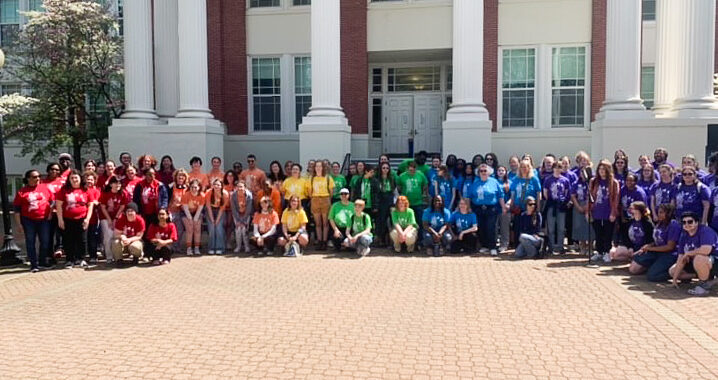President Paino engages with students about 2019-2020 budget
4 min read
The Blue and Gray Press
By EKATERINA SAVELYEVA
Staff Writer
On Wednesday, March 13, UMW President Troy Paino spoke at a town-hall event called “Can We Talk?” With fourteen students, two board members, and six UMW administrators in attendance, President Paino went over the projections for the UMW budget next year and took questions about tuition and fees for the following year, and the budgetary considerations they are connected to.
“Can We Talk?” events happen periodically with various members of the UMW administration, but Paino specifically has been speaking at them every semester since the spring of 2018, when he discussed the same issues of tuition and fees that this particular forum focused on.
“It’s always a challenge in terms of what’s the best way to get information but also how to hear from the students,” said Paino. “We try a variety of methods, and this is one we talked about with the SGA about helping to facilitate conversation with the students.”
Prospective changes in tuition and fees and how they related to the budget were first outlined by the president. Then he delivered the news about state incentives that have encouraged UMW to increase state tuition by zero percent, while out-of-state tuition would increase about two percent. In addition, Paino stated that the university is planning changes in relation to the distribution of fees, hoping to allocate some money from the housing fee to the auxiliary fee instead.
“What happened is that the revenue from the housing was going towards all those other things,” said Paino. “The problem with that is that it penalizes people who live in our residence halls to pay for things that people who weren’t living in our residence halls weren’t having to pay.”
Together, these changes create a planned increase in cost of attendance of 2.4 percent for in-state residential students, 2.7 percent for out-of-state students, and about four percent for commuters.
The forum was then opened to questions, which gave students an opportunity to represent their own areas of interest and campus involvement.
Senior business administration major Bryant Atkins represented his membership in the Association of Residence Halls (ARH) by bringing up the question of their future.
“Our core mission is to make sure that our halls feel like home,” said Atkins. “We were wondering what is the university’s plan to ensure that the physical homes are a healthy environment.”
Paino acknowledged the importance of residence halls, mentioning his appreciation for the renovation of Arrington and his excitement about the current renovation of Willard. He also covered the mold issues of this fall and the newly installed air conditioning units in rooms.
“It’s a balancing act,” said Paino. “In a fairly short amount of time, we’ve taken on some pretty significant renovation projects.”
While he acknowledged the financial difficulty of hall renovations, Paino stressed UMW’s commitment to ensuring living space for its on-campus students. “Our goal is to provide just as many beds as students who want to live on campus.”
Recognizing the need to cut the budget in other places to make space for minimized tuition increases, Alex Lee spoke on behalf of student scholarships.
“I know that scholarships and grants are an incentive for a lot of students to come to the university in the first place,” said Lee. “I’m wondering how the budget changes are going to affect the amount for scholarships and grants for incoming classes.”
Paino responded that student financial aid is an enormous investment on the university’s behalf, and that it is going to stay that way. The budget devoted 8.8 million dollars on student financial aid this year, and a projected 9.6 or 9.7 million next year.
While these costs are indeed impressive, Paino stressed that their maintenance is a high priority. “We’re finding places other than student financial aid,” Paino assured. “It’s an investment, and we certainly know that it’s important for students, both on a need-based and on a merit-based level.”
During the forum Paino emphasized the importance of maintaining the things that make UMW special.
“I know I’ve heard from students that they value small class sizes, the opportunity to get to know faculty, so that’s an area we have tried to preserve,” said Paino. “We think that one of the distinctive things about Mary Washington is that faculty-student interaction.”
Over half of the students in attendance spoke up during the discussion. After Paino closed the forum, many students stayed to talk to him, as well as to university administrators with insights on their particular issues.
A particular issue many students confronted through information Paino presented was the uneven distribution of increases in fees. For instance, the nature of debt service for Eagle Landing and the UMW Apartments means that their rates will increase next year while the rest of housing stays the same.
“If housing increases, that affects me,” said freshman digital studies major Kendall Resnick. “I was planning to live in Eagle next year, so it does make a difference.”
Lisa Jamison Bowling, vice president for Advancement and University Relations, was impressed with the conversation that had taken place.
“I’m very pleased when I see student engagement and students asking such insightful questions, and really trying to look at the big picture of their education: not just in the here and now, but what the overall impact will be for the university,” said Bowling.
Freshman American studies and historic preservation major Jessica Lynch was also satisfied with the forum. “I appreciated the style of the forum and Paino’s willingness to listen to the students,” said Lynch. “I can tell he really cares, and he explained complicated topics in an easy fashion.”











